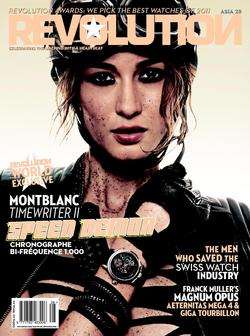Revolution (magazine)
|
| |
|
Revolution Asia Vol. 28 | |
| Categories | Horology, Luxury, Mechanical Watches |
|---|---|
| Founder | Wei Koh |
| First issue | First Quarter 2005 |
| Company | Revolution Media |
| Language | English, Italian, Russian, Spanish, Simplified Chinese, Traditional Chinese |
| Website |
revolution |
Revolution is a quarterly publication about luxury mechanical watches. First published in 2005, it is now one of the leading magazines in its sector, with a readership that consists of both watch connoisseurs and industry insiders, from designers to CEOs. It is currently available in 13 international editions (12 print, one digital) in six different languages.
The magazine blends watch reviews and articles, with cutting-edge styling and photography.
Contents of the magazine
The magazine covers the entire spectrum of issues with regards to watches and watchmaking.
The main body of the publication is product-centric, with an emphasis on the technical and artisanal sides of each timepiece. This involves evaluating features such as the movement, its complication, as well as the materials that go into the making of the watch. It also includes product and fashion spreads that feature watches of a particular theme, material, or complication.
Apart from the product focus, there is also a strong interest in the process of watchmaking. This includes interviews with various members of the watchmaking industry, such as company CEOs and watchmakers themselves, to give readers more information about the inspirations and designs of the watches and the brands in the market. In-depth articles on the factories and manufactures in places such as Switzerland and Germany are often seen in the magazine, shedding more light on the craft and artisanship of the watches.
Revolution specializes in feature-length stories that presents watchmaking through different perspectives. One notable story on the cultural interest of horology explored the relationship between major hip hop artist, Jay-Z, and his favored timepieces. They have also done a story about counterfeit luxury watches, drawn from business and socio-economic perspectives, and a historical account of the Quartz Crisis including the knock-on effects of the US withdrawal from the Bretton Woods System.
The publication also features coverage of watch related events, such as boutique openings, product launches and new collaborations.
Brands discussed within the pages of Revolution include the major horological players such as those from the Richemont Group (Cartier, IWC, Jaeger-LeCoultre, Vacheron Constantin, etc.), Swatch Group (Breguet, Blancpain, Longines, Omega, etc.), Audemars Piguet, Chopard, Franck Muller, Patek Philippe and Rolex. Independent, niche brands (such as URWERK, MB&F, and Greubel Forsey) that produce in small quantities and are favored by connoisseurs are also covered at length.
Circulations and editions
Revolution has 12 print editions available worldwide in six different languages. Of these 12 editions, six (Asia, Australia, China, Switzerland, United Kingdom and United States) are under direct control of headquarters. The others are licensed editions, created and distributed by local publishing partners.
| Edition | Language |
|---|---|
| Asia (Singapore, Malaysia) | English |
| Australia | English |
| China | Simplified Chinese |
| Hong Kong | English |
| Italy | Italian |
| Mexico and Latin America | Spanish |
| Russia | Russian |
| Switzerland | English and Simplified Chinese |
| UAE | English |
| UK | English |
| USA | English |
| Taiwan | Traditional Chinese |
On the Internet
Revolution's website is frequently updated with news about watch-related events and new collaborations, as well as full-length feature articles about watches and upcoming releases. The website also has links to exclusive in-house videos with technical explanations and interviews.
Digital magazine
As of March 2012, Revolution has made available digitalized versions of the magazine to be downloaded and read through the Zinio E-reader application. This version can be viewed on desktop systems, the Apple iPad and iPhone, as well as Android devices. Featuring exclusive stories as well as content compiled from the different print editions, this new platform allows for videos to be embedded and viewed as a complement to the written articles.
